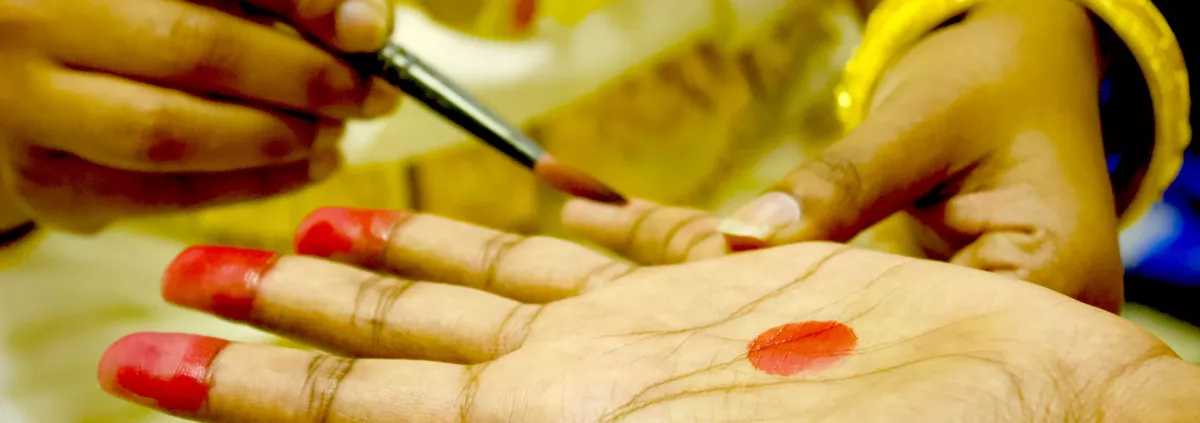A young woman in her 20s in an all-white ensemble is climbing mountains, while a background voice says “freedom from tension on the difficult days.”
A girl is sleeping on a bed with white covers, dressed in her white night suit. She is tossing and turning over while the background says freedom from stains.
These were advertisements for hygiene products in India. The ads are very discreet and do not address the real issues associated with periods. They talk about having fun and freedom from stains, while the concerns to be addressed are menstrual hygiene and spreading awareness.
Menstruation is a taboo topic in India, always talked about in hushed voices. A majority of Indian adolescent girls are not aware of the changes happening in their bodies. According to statistics, 71% of girls in India lack knowledge about menstruation before their first period.
(Religious rituals being performed inside a Temple in India Photo:
Periods are considered as a disease where women are considered to be dirty and are prohibited from doing certain things such as entering the temples, touching food items and carrying on with their daily routine life.
Indian women, young or old, educated or illiterate, urban or rural, feel embarrassed to talk about the topic. Even at present, they feel shy to utter the word periods and use local synonyms like those days, dates, problem days, etc. when they have to talk on the subject. Period talk is considered to be an elephant in the room in many Indian families.
The lack of menstrual awareness is a challenge that the country is grappling with for many decades. According to UNESCO and Whisper, 23 million girls drop out of school every year, due to the lack of menstrual awareness and hygiene. Many young girls and women in the second and third-tier cities and rural areas have limited access to menstrual hygiene products and limited knowledge on menstrual hygiene. According to the National Family Health survey 2015-16, out of 336 million menstruating women in India, only 36% of women use sanitary pads. The percentage drops further in rural districts.
The pandemic and lockdowns have intensified the taboos surrounding periods further as women were forced to stay indoors with little or no access to sanitary pads, especially in the rural areas. The discomfort of managing periods in confined spaces with crowded and unhygienic washrooms have worsened the problems further. The loss of income and closure of schools forced many girls to switch from sanitary napkins to cloth, rags, ash and other unhygienic materials. Poor menstrual hygiene and the use of reusable sanitary products in unsanitary conditions can increase the chances of contracting cervical cancer, Urinary Tract infections, Reproductive Tract infections, yeast and fungal infections, and Hepatitis B.
In such a scenario, the need for sustainable policies for better Menstrual Hygiene Management (MHM) has increased manifold. The Indian government is taking several measures such as free sanitary napkin distribution in slums and rural areas, and educating girls and women about the use of sustainable sanitary products. The inclusion of MHM in the Swachh Bharat Mission is also a significant step towards increasing menstrual awareness in the country. The Ministry of Health and Family Welfare has also launched a scheme for the promotion of menstrual hygiene in adolescent girls in the age group of 10 to 12 years.
However, there is much scope for improvement in making periods normal. The culture of silence about menstruation must be broken with sustained efforts to change the mind sets and societal conditioning. Innovative measures have to be adopted to bring the much-required change at the grass-roots levels by de-stigmatising the issues related to periods.
The introduction of comprehensive sexuality education for adolescent students is essential to enable them to get knowledge about sexual and reproductive health in a dignified manner. Both in-school and out-of-school students must be educated about puberty, menstruation, sexual health and other issues to sensitise them and bring behavioural changes.
An Indian woman and professional dancer of the classical dance Bharata Natyam, getting the make-up and styling before her performance in India (
There is a need to engage all the sections of society, men and women, boys and girls in period talk to shatter the myths and taboos related to the issue and make it normal. Men and boys must be encouraged to candidly talk about periods to encourage conversations and break stereotypes. Involving men and boys in period conversations will also help to promote gender equality as it will enable them to positively impact the menstrual experience of girls in their roles such as father, brother, friend, husband, employer and policymaker.
The persistent campaigns in online spaces by several NGOs, Sanitary product brands and the government are changing the perception about menstruation in the country. Many brands have recently launched stereotype breaking campaigns such as Sofy’s #Iamnotdown and Whisper’s #TouchthePickle. Menstrual hygiene brands across the spectrum are changing their advertising strategy from purely product-based to addressing a purpose. The recent campaigns such as Raho Safe’s #Menbuypads and Stayfree’s daughters’ day campaign that urges fathers to talk about periods to their daughters, and the #reddotchallenge by UNICEF are some examples of how popular brands are trying to change the perception of periods in the country.
Realising the importance of ensuring menstrual hygiene for women around the world, May 28th is commemorated as Menstrual Hygiene Day. The theme for the Menstrual Hygiene Day 2021 was “Action And Investment in Menstrual Hygiene and Health.”, which called for intensive action from all the stakeholders and change makers for ensuring menstrual education and hygiene for every woman.
Sources:
1. thedrum.com
2. adgully.com
3. businessinsider-in.cdn.ampproject.org
4. swacchhindia.ndtv.com
5. nhp.gov.in
6. https://www.weforum.org/agenda/2019/11/menstruation-in-different-cultur…
7. https://www.wateraid.org/uk/media/better-toilets-accurate-information-a…
(By Parimita Krishna, Communications Consultant – UNDP in India)

Please log in or sign up to comment.